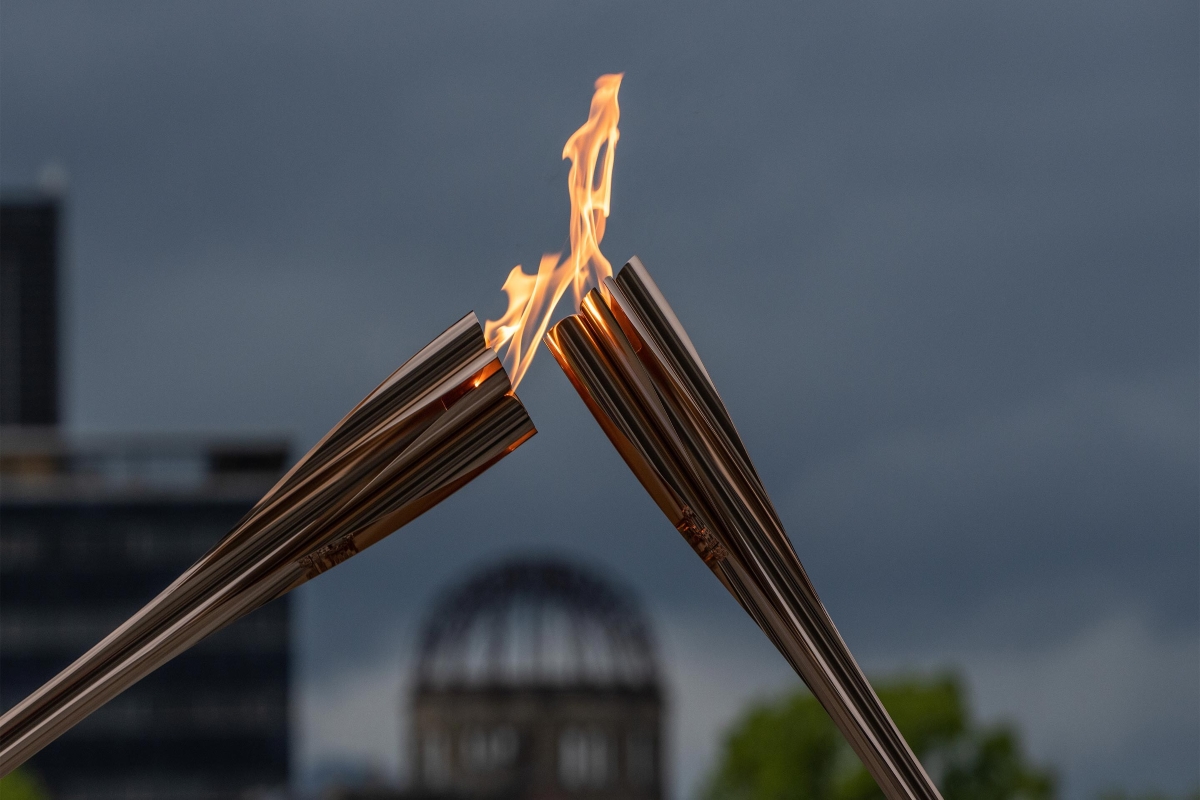The pressure of hosting an Olympics during a still-active pandemic is beginning to show in Japan as the games are slated to begin 23 July.
Organisers are determined to hold the games with reduced or no spectators at all.
Advertisement
Japan has takes leaps forwards in vaccination but it is losing steam due to vaccine shortages.
With tens of thousands of visitors coming to a country that is only 13.8 per cent are fully vaccinated, gaps in border controls have emerged, highlighted by the discovery of infections among the newly arrived team from Uganda, with positive tests for the highly contagious delta variant.
As cases grow in Tokyo, so have fears that the games will spread the virus.
“We must stay on high alert,” Prime Minister Yoshihide Suga told reporters on 1 July. Noting the rising caseloads, he said “having no spectators is a possibility.”
Seiko Hashimoto, president of the Tokyo organizing committee, agreed.
“It’s not that we are determined to have spectators regardless of the situation,” Hashimoto said on Friday.
Organizers, the International Olympic Committee and others are expected to meet this week to announce new restrictions because of the fast-changing coronavirus situation.
Suga vowed to ensure appropriate border controls as a growing number of Olympic and Paralympic athletes, officials and media begin entering Japan for the games.
On Monday, Tokyo confirmed 342 new cases, the 16th straight day of an increase. On Saturday, the capital reported 716 cases, highest in five weeks.
At a meeting of government advisers, experts warned of the possibility of infections exploding during the games, projecting daily caseloads exceeding 1,000.
Ryuji Wakita, director-general of the National Institute of Infectious Diseases and the head of a government Covid-19 advisory board, urged tighter border controls to detect and isolate infected arrivals at airports.
On Saturday, an athlete from Serbia also tested positive, causing the cancelation of his team’s training in the central city of Nanto. The government also has acknowledged that four other people arriving for the Olympics tested positive after entering the country earlier this year.
Experts say the cases show that Japan’s border health controls can be easily breached.
“There will be more people coming in. … We should use this as a lesson so that similar problems won’t be repeated elsewhere in Japan,” Osaka Gov. Hirofumi Yoshimura told a recent regional governors’ meeting.
Under revised guidelines on health measures sent to 530 municipalities hosting Olympic training, airport officials will isolate an entire group if any member tests positive, and they will stay at designated facilities until the athletes’ village opens 12 July.
Hosting towns can request guests to stop training and isolate themselves until they clear contact tracing and virus tests.
Dozens of municipalities in Japan have canceled their hosting arrangements because of virus worries, and many of them decided to use those facilities as vaccination sites.
In Tokyo, infections are spreading among the young and middle-aged who are largely unvaccinated.
Japan’s fully vaccinated rate of 13.8 per cent is slightly above the world average of 11.3 per cent but low compared with 47.4 per cent in the United States and 49.5 per cent in the UK, according to the US Centers for Disease Control and Prevention and Our World in Data.
Adding to the worries is uncertainty about Japan’s vaccination campaign.
A vaccination center in Kagawa had to suspend shots for 30,000 people, and plans were put on hold for 6,500 companies in Gifu, in central Japan. Other areas including Osaka, Kobe and parts of Tokyo also were forced to suspend planned vaccinations from this week.
“What a disappintment,” said Yukio Takano, head of Tokyo’s Toshima district. “We have worked so hard to accelerate the rollouts and now we have to put on the brakes. … What was the rush for?”
Suga set up military-run mass vaccination centers in late May and added workplace and college campus venues to accelerate the progress.
Experts suggest, however, that a resurgence might require another emergency declaration during the Olympics. If so, organizers may have to reconsider their current limit of 10,000 people or 50 per cent capacity at venues to perhaps barring all spectators.
Kengo Sakurada, president of Sompo Holdings and the head of an influential business lobby, said on 30 June that the current vaccination rate is not enough to hold a safe Olympics.
He said he supports having no spectators for events because the damage from a worse outbreak would be far greater.
“I would take the safer option,” he said.











